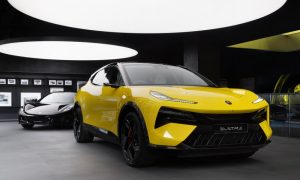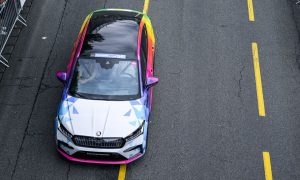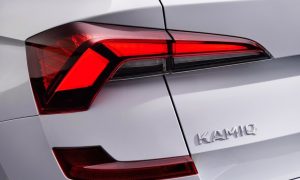
In its eighth generation, Vauxhall’s All-New Astra will be available for the first time as battery electric Astra-e. Plug-in hybrid and highly efficient petrol and diesel versions of the All-New Astra go on sale next month, with the Astra-e following in early 2023. A Sport Tourer version of All-New Astra will follow the hatchback in late 2022.
Versions with highly efficient petrol and diesel engines in combination with friction-optimised six-speed manual and eight-speed automatic transmissions will also be available to order from next month.
The new Astra portfolio has something for everyone in terms of drivetrains. Customers will soon be able to choose between plug-in hybrid or efficient internal combustion engine with a pure-electric version to follow. The power range extends from 110PS to 225PS system output – so superior driving performance is guaranteed. Vauxhall combines driving fun with top efficiency and responsible motoring in the next generation of its compact class bestseller. The new Astra continues Vauxhall’s tradition of always bringing innovative and ground-breaking technologies to the compact class that are affordable for all – also in its powertrain offer.
Astra goes Electric
The All-New Astra will be available as a fully-electric model from 2023. And will join the Vauxhall all-electric line-up alongside Corsa-e, Mokka-e, Combo-e Life and Vivaro-e Life, as well as an already fully-electric light commercial vehicle line-up of Combo-e, Vivaro-e and Movano-e. Vauxhall’s line-up will be electrified across the line-up by 2024 and solely fully-electric from 2028 – years ahead of the UK Government’s deadline.
High-tech drive for highest efficiency: The All-New Astra as a Plug-in Hybrid
The top-of-the-line hybrid offers system output of 225PS and maximum torque of a powerful 360Nm (fuel consumption WLTP1: 201.8mpg-256.8mpg, 31-24 g/km CO2; both combined). Powerful performance is ensured by the exemplary interaction between the combustion engine and the electric motor. The 1.6-litre four-cylinder produces 180PS. The electric motor contributes up to 110PS. Power is sent to the front axle via a comfortable eight-speed automatic transmission.
Alternatively, a Plug-in Hybrid version with 180PS system output will also be available. The maximum torque here is also a powerful 360Nm (fuel consumption WLTP1: 201.8mpg-256.8mpg, 31-24 g/km CO2; both combined). In this case, the petrol engine contributes 150PS. Both plug-in hybrid vehicles offer a lot of driving fun: they feature sports car-like acceleration from zero to 62mph in 7.7 and 7.9 seconds, respectively, and reach a top speed of up to 146mph and 140mph (electronically controlled).
For emissions-free city driving, the electric mode can simply be selected. Then, thanks to its 12.4kWh battery, the new Astra Hybrid drives up to around 35 miles (WLTP1) purely electrically.
Ultra-modern combustion engines: Lively petrol and diesel engines
At the same time, customers can choose the type of drive they want, depending on their requirements and individual preferences. The Astra’s combustion engine portfolio are characterised by high economy and low fuel consumption.
The 1.2-litre three-cylinder turbo petrol direct injection engine with six-speed manual gearbox delivers 110PS (fuel consumption WLTP1: combined 52.3mpg, 125-123 g/km CO2). In addition, the petrol engine is also available with 130PS – with a six-speed manual gearbox (fuel consumption WLTP1: combined 51.4mpg-52.3mpg, 127-122 g/km CO2) or with eight-speed automatic transmission (fuel consumption WLTP1: combined 49.6mpg-51.4mpg], 131-125 g/km CO2). The petrol engine delivers its maximum torque of 230Nm from 1,750 rpm.
The 1.5-litre four-cylinder diesel with 130PS delivers 300Nm maximum torque from 1,750rpm and is available with a six-speed manual gearbox (fuel consumption WLTP1: combined 62.8mpg-64.3mpg, 117-113 g/km CO2) or an eight-speed automatic transmission (fuel consumption WLTP1: combined 60.1mpg-62.8mpg, 121-116 g/km CO2).
Eight Generations – A bestseller for 40 years
The success story of Vauxhall’s bestseller began over 40 years ago. With the All-New Astra, the British manufacturer is now opening the next chapter: for the first time, the compact class model is available with electric drive.
The new Vauxhall Astra is also a design statement for the brand. Dynamic as never before, with sheer, taut surfaces, detoxed of superfluous elements and with the new brand face – the Vauxhall Vizor. With the next compact class generation, Vauxhall shows that the Astra is ready to define a new era.
The new Vauxhall Astra will launch this year as a sporty five-door with a low-slung look and yet more space than its predecessor. With a length of 4,374mm and width of 1,860mm, it hits the sweet-spot of the compact sector.
Thanks to the especially short front overhang, the new Astra is only 4mm longer than the previous model, despite the considerably increased wheelbase of 2,675mm (+13mm). Notwithstanding the muscular, confident stance, the new Astra’s practical boot with adjustable floor still offers the driver and four passengers 422 litres of luggage volume.
Like its predecessor launched in 2015 – that was named European Car of the Year 2016 – the newcomer brings innovations to the compact class that customers previously only knew from more expensive vehicles. For example, the Astra can turn night into day: the latest evolution of the adaptive Intelli-Lux LED® Pixel light comes straight from Vauxhall’s flagship Insignia and, with 168 LED elements, leads the way in the compact and midsize market sectors.
A leap in time has taken place in the interior of the new generation Astra. With the fully digital Pure Panel, analogue instruments are consigned to history. Instead, the new human-machine-interface (HMI) with fresh, modern graphics offers customers a pure, more intuitive experience. Passengers can operate the new Astra intuitively via extra-wide touchscreens, just like a smartphone. The Vauxhall designers and engineers have taken great care to ensure that the driver receives all the necessary information and useful operating options, but is not burdened with superfluous data or functions. In addition, key settings such as climate control can still be operated via physical switches and buttons.
Typically Vauxhall is also the outstanding seating comfort of the new compact class model. The front seats, developed in-house, are AGR (“Aktion Gesunder Rücken e.V.”) certified and, with their exemplary ergonomics, are exceedingly comfortable, especially on long journeys. The driver is supported by state-of-the-art assistance systems ranging from the Intelli-HuD head-up display to the semi-automated Intelli-Drive assistance system and the Intelli-Vision 360-degree camera.
New interpretation of bold and pure Vauxhall design philosophy
After the Mokka, Crossland and Grandland SUVs, the new Astra is Vauxhall’s first hatchback to interpret the brand’s bold and pure design philosophy. The Vauxhall Vizor (the new face of the brand first seen on the Mokka and the central exterior design element) follows the Vauxhall Compass where the vertical and horizontal axes – the sharp crease in the hood and the wing shaped graphic of the daylight running lamps – intersect with the Vauxhall Griffin emblem in the middle. Stretching across the front, making the new Astra look even wider, the Vizor also seamlessly integrates technologies such as the ultra-slim Intelli-Lux LED® headlamps and the front camera of the Intelli-Vision system. Viewed from the side, the next-generation Astra looks especially dynamic thanks to the pronounced forward rake of the C-pillar.
At the rear, the Vauxhall Compass is repeated by the centrally mounted Griffin, the vertically aligned high-mounted brake lamp and the tail lamps (energy-saving LED, as is all exterior lighting). The Griffin emblem also doubles as the latch for the tailgate, which is made of state-of-the-art composite material. This technology is not only light in weight and rigid, it also allows the precise execution of design details such as the especially slim tail lamps. The Astra is available with two-tone paint
Mark Adams, Vice-President Design, Vauxhall, said: “The All-New Astra represents the exciting next step of our new design execution. With its bold Vizor front face, strong muscular wheel arch blisters and sheer surfacing, the All-New Astra has a very sporty and confident personality. The interior also takes a bold step into the future. The strong driver-orientated cockpit with seamless glass look of the new Pure Panel will bring a whole new emotional experience to our customers.”
Next-generation Pure Panel digital cockpit with fully-glazed option
The same technical precision applies throughout the interior where the absolute highlight is the next generation of the Pure Panel – a concept first introduced in the Mokka. This expansive, digital cockpit features two 10-inch displays, seamlessly integrated with glass-to-edge design – even integrating the driver’s side air vent in a horizontal format. Thanks to a shutter-like layer that prevents upward reflections in the windscreen, the design dispenses with a hood over the displays, which further enhances the high-tech functionality and ambience.
The Pure Panel achieves the optimum balance between digitisation and intuitive operation, detoxed of irritating visual stimuli and without the need for sub-menus. Buttons are present for the most-used functions. There is no need for cables either, since the infotainment system – which can be operated by voice recognition as well as by touch – can be connected as standard on all model variants to wireless Apple CarPlay and Android Auto via compatible smartphones.
Dynamic yet composed handling, braking and stability
The new Astra is based on the third generation of the highly flexible EMP2 multi-energy architecture, with Vauxhall DNA built in from the start of development. This means that the handling is composed as well as dynamic.
The steering and lateral stiffness of the chassis – McPherson strut suspension at the front, torsion bar at the rear – are designed for high yaw control (damping of the movement around the horizontal axis). Under braking, the new model delivers strong stopping power and remains highly stable in curves as well as in a straight line. The torsional rigidity of new Astra is 14 per cent higher than its predecessor.
Advanced driver assistance systems including semi-automatic lane change
The new Astra’s architecture also incorporates the latest automated driver assistance systems. In addition to the multifunction camera in the windscreen, the technology comprises four body cameras (one at the front, one at the rear and one on each side), five radar sensors (one at the front and one at each corner), as well as ultrasonic sensors front and rear.
Cameras and sensors are integrated with e-horizon connectivity in Intelli-Drive, which extends the range of the cameras and the radar. This enables the system to adapt the speed in curves, make speed recommendations and perform semi-autonomous lane changes. Hands-off detection on the steering wheel ensures the driver remains engaged at all times.
The long list of automated driver assistance systems also includes adaptive cruise control, which increases or decreases speed to follow the vehicle ahead and can brake to a standstill if necessary. With the automatic transmission, driving resumes automatically thanks to “Stop & Go”.
The offer of class-leading assistance systems additionally features a large Intelli-HuD head-up display, long-range blind-spot detection, Intelli-Vision 360-degree camera for easier parking, extended traffic sign recognition, rear cross-traffic alert and active lane positioning, which keeps the car in the middle of the driving lane.
New Astra brings premium Intelli-Lux Pixel Light® to compact market sector
The Astra’s role as advanced technology carrier continues in lighting and seats, typical areas of expertise for the Vauxhall brand. The previous model played a pioneering role in the introduction of adaptive matrix light in 2015 and the next-generation is now bringing the newest development in lighting to the compact market sector for the first time – Intelli-Lux LED® Pixel Light. This state-of-the-art technology, already available on Vauxhall’s Grandland SUV and Insignia flagships, is upgraded to features a segment-leading total of 168 LED elements – 84 in each ultra-slim headlamp. The main beam adjusts seamlessly in milliseconds, without glare for other road users. Approaching or preceding traffic is “cut out” precisely. The range and direction of the light vary according to the driving situation and surroundings.
Best-in-class ‘AGR’ ergonomic seats with massage and ventilation
Vauxhall’s ergonomic AGR seats enjoy an award-winning reputation and the new Astra continues this long-standing tradition. Certified by “Aktion Gesunder Rücken e.V.” (“Campaign for Healthy Backs”) the position of the front seats is 12mm lower than in the previous model, further enhancing the feeling of a “sporty” drive. Good posture is guaranteed, with the foam density of the seats optimised according to the “Sport” or “Comfort” contours.
The new Astra’s AGR front seats are the best the compact class has to offer and feature a wide range of optional adjustments, from electric tilt to electro-pneumatic lumbar support. In Nappa leather-trim, they even offer ventilation, massage for the driver and heating at the rear as well as the front. Seats trimmed in stylish Alcantara are also available.
Astra goes electric for first time with powerful plug-in hybrids
The new Astra will be available from the start of sales with powerful plug-in hybrid electric drive as well as highly efficient petrol and diesel engines, electrifying Vauxhall’s compact class model for the first time in the brand’s history. Power ranges from 81kW (110PS) to 96kW (130PS) with the petrol and diesel variants and up to 165kW (225PS) system output with the plug-in hybrid variants. A six-speed gearbox is standard on the petrol and diesel power units, with an eight-speed automatic transmission (electrified on the plug-in hybrids) optional on the more powerful engines.
Vauxhall will open the order books for the new Astra this autumn. The first customers will take delivery of their cars early next year. Further details including UK pricing and specification will be announced at the on sale date.
Previous article
Audi accelerating transformation: “Vorsprung 2030”





